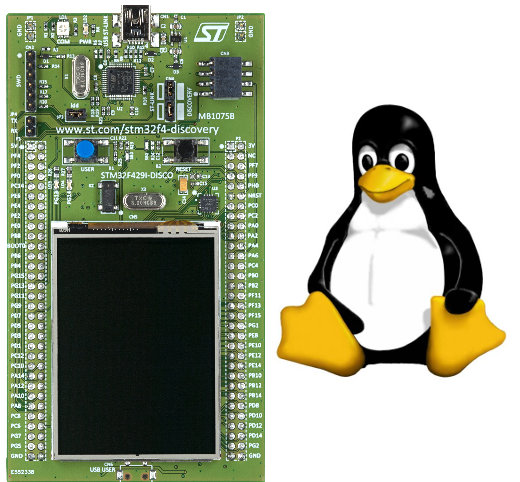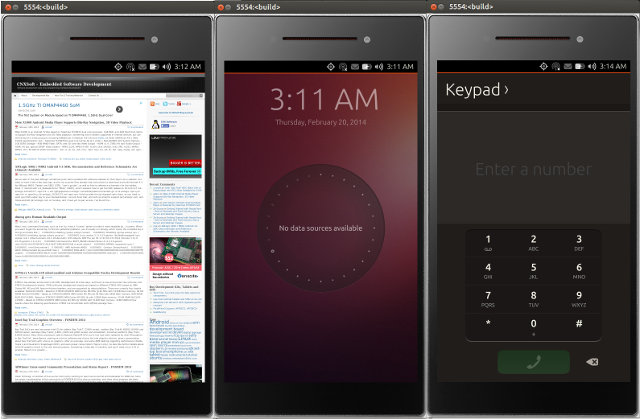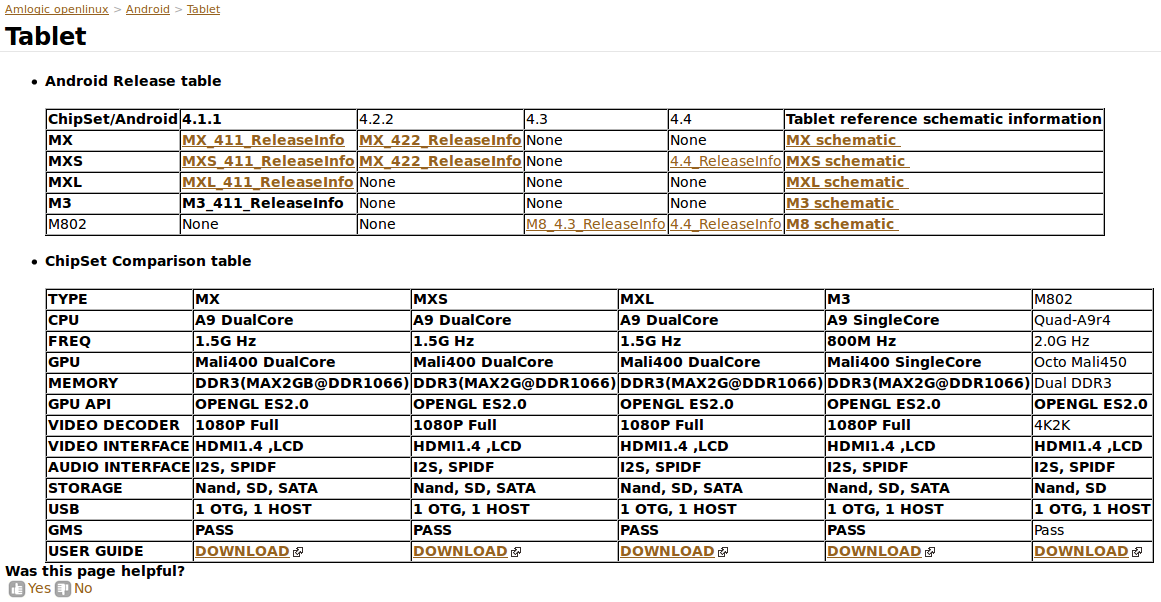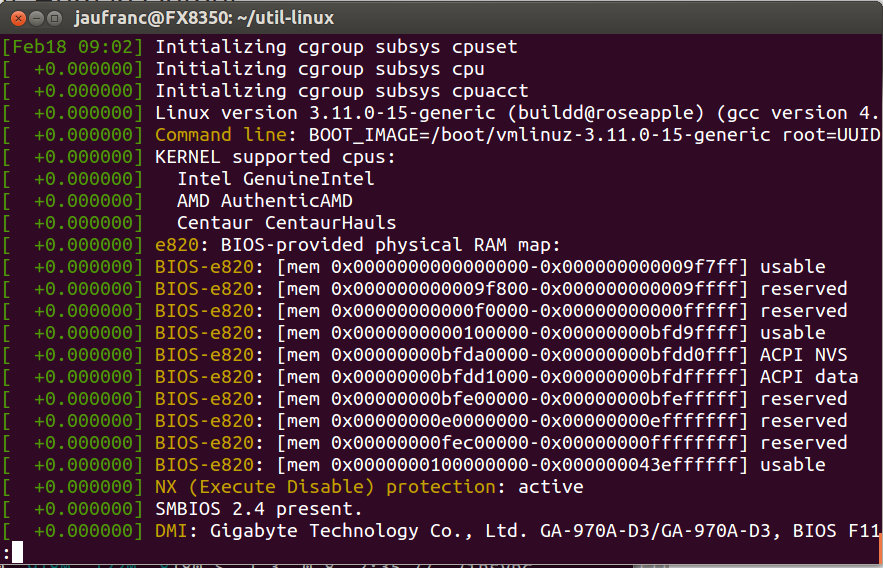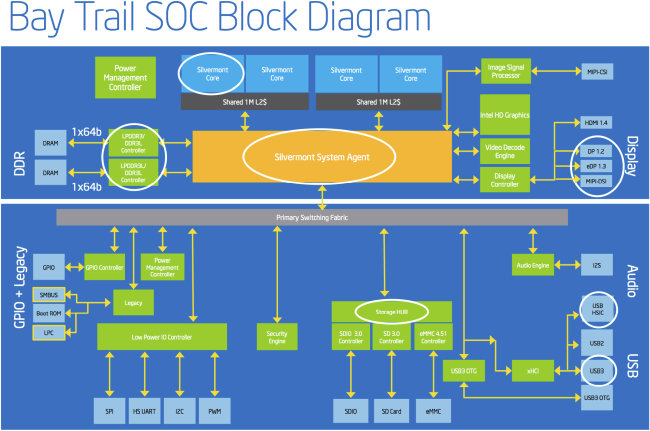If you want to run Linux on STM32 Discovery board, more exactly STM32F429 Discovery board, it’s now possible thanks to Emcraft Systems’ BSP for STM32F429 Discovery Board. It will only work on that particular version of the discovery board as it features 64Mbit external SDRAM, which is required for uClinux, and missing on other STM32 Discovery boards. You can either get u-boot and (uC)Linux from the company’s github account which contains the required patches, but lacks complete documentation, and a default config file for the kernel for example, or purchase a BSP ($33) with 3-month support, and pre-built u-boot and Linux binaries. There’s also publicly available documentation explaining how to flash the bootloader and the kernel among other things, and links to relevant external resources, without the need to spend any money. Jean-Luc Aufranc (CNXSoft)Jean-Luc started CNX Software in 2010 as a part-time endeavor, before quitting his job as a […]
Samsung GH7 Quad Core 64-bit ARM SoC Code Submitted to Linux
Following my post about Samsung Exynos 5260 hexa core processor, I’ve been informed that some other patches have been submitted about Samsung GH7 ARMv8 SoC, which should be the other processor announced at MWC 2014. A look at the device tree file shows four ARMv8 cores:
|
1 2 3 4 5 6 7 8 9 10 11 12 13 14 15 16 17 18 19 20 21 22 23 24 25 26 27 28 29 30 31 32 33 34 35 36 37 38 39 40 |
+/ { + model = "SAMSUNG GH7"; + compatible = "samsung,gh7"; + interrupt-parent = <&gic>; + #address-cells = <2>; + #size-cells = <2>; + + cpus { + #address-cells = <2>; + #size-cells = <0>; + + cpu@000 { + device_type = "cpu"; + compatible = "arm,armv8"; + reg = <0x0 0x000>; + enable-method = "spin-table"; + cpu-release-addr = <0x0 0x8000fff8>; + }; + cpu@001 { + device_type = "cpu"; + compatible = "arm,armv8"; + reg = <0x0 0x001>; + enable-method = "spin-table"; + cpu-release-addr = <0x0 0x8000fff8>; + }; + cpu@002 { + device_type = "cpu"; + compatible = "arm,armv8"; + reg = <0x0 0x002>; + enable-method = "spin-table"; + cpu-release-addr = <0x0 0x8000fff8>; + }; + cpu@003 { + device_type = "cpu"; + compatible = "arm,armv8"; + reg = <0x0 0x003>; + enable-method = "spin-table"; + cpu-release-addr = <0x0 0x8000fff8>; + }; + }; |
The patch also include code for Samsung SSDK-GH7 board with 2GB RAM. That’s about all we know for now. Thanks to David for the tip. Jean-Luc Aufranc (CNXSoft)Jean-Luc started CNX Software in 2010 as a part-time endeavor, before quitting his job as a software engineering manager, and starting to write daily news, and reviews full time later in 2011. www.cnx-software.com
Try Ubuntu Touch on Your Computer with Ubuntu Touch Emulator
Canonical has just announced Meizu (China) and Bq (Europe) will be the first manufacturers to launch Ubuntu Touch phones at the end of 2014. But if you want to try Ubuntu Touch, and don’t own a Google Nexus 4 or 7, or simply don’t want to flash Ubuntu Touch to your devices, you can do so using Ubuntu Touch x86 Emulator in your computer running Ubuntu , or in an Ubuntu Virtual machine in Virtualbox or VMWare. The emulator has been available since last November, but Ricardo Salveti announced an updated version, the first public preview, with the following changes: Better TLS handling (not using the Android slots, but using pthread_set/getspecifics instead) Qt packages compatible with OpenGL ES 2.0 available at https://launchpad.net/~rsalveti/+archive/qt-gles-test It has been tried on Ubuntu Trusty (14.04), but I could run it just fine on Ubuntu Saucy (13.10), by following the instructions below in a terminal: Download […]
AMLogic S802 / M802 Android 4.4 SDK, Documentation and Reference Schematics Are (Almost) Available
We’ve seen in the past AMLogic sometimes pushes some updated GPL software releases on their Open Linux website. So I went to have a look a few days ago, and to my surprise they already had instructions to download and build Android 4.4 for AMLogic M802 (Tablet) and S802 (STB), “user’s guides”, as well as links to reference schematics for the tablets… Nice!!! I started with 4.4_ReleaseInfo for “Mbox” (S802), which explains how to get the SDK release on 2014-01-27 (kk-amlogic-20140127):
|
1 2 3 4 |
repo sync repo init -m openlinux_kk-amlogic_20140127.xml repo sync |
Unfortunately the joy stopped right there, as you need to send your SSH public key to your representative. I’ve just done that, and sent an email to support [at] amlogic.com, and mbox-android [at] amlogic.com on Sunday, and I have yet to gain access. I’ve found the “mbox-android” email in from Mbox page (similar to screenshot above) in a field right of “reference schematics” column, which has been removed […]
dmesg gets Human Readable Output
Many Linux command line tools, such as ls or du, have a “human” option to make it more readable by… humans. When you want to get the kernel log, to find otu potential problems, you’d usually run dmesg, which dump the complete log in one go and looks like: [ 0.000000] Initializing cgroup subsys cpuset [ 0.000000] Initializing cgroup subsys cpu [ 0.000000] Initializing cgroup subsys cpuacct [ 0.000000] Linux version 3.11.0-15-generic (buildd@roseapple) (gcc version 4.8.1 (Ubuntu/Linaro 4.8.1-10ubuntu8) ) #25-Ubuntu SMP Thu Jan 30 17:22:01 UTC 2014 (Ubuntu 3.11.0-15.25-generic 3.11.10) [ 0.000000] Command line: BOOT_IMAGE=/boot/vmlinuz-3.11.0-15-generic root=UUID=9c042788-fa75-4fc4-9b12-598c809410e8 ro quiet splash [ 0.000000] KERNEL supported cpus: [ 0.000000] Intel GenuineIntel [ 0.000000] AMD AuthenticAMD [ 0.000000] Centaur CentaurHauls [ 0.000000] e820: BIOS-provided physical RAM map: [ 0.000000] BIOS-e820: [mem 0x0000000000000000-0x000000000009f7ff] usable [ 0.000000] BIOS-e820: [mem 0x000000000009f800-0x000000000009ffff] reserved [ 0.000000] BIOS-e820: [mem 0x00000000000f0000-0x00000000000fffff] reserved [ 0.000000] BIOS-e820: [mem 0x0000000000100000-0x00000000bfd9ffff] usable [ 0.000000] BIOS-e820: […]
Intel Bay Trail Graphics Overview – FOSDEM 2014
Bay Trail SoCs are new low power Intel ICs for tablets (Bay Trail-T, Z3000 series), mobiles (Bay Trail-M, N2800, N2900 and N3500 series), desktops (Bay Trail-D, J1800, J1900 and J2900 series) and embedded / industrial platforms (Bay Trail-I, E3800 series). Many Atom processors used to features PowerVR GPU, but it has now been replaced by Intel HD graphics in Bay Trail SoC. Jesse Barnes, working at Intel on software and drivers for Intel graphics devices, gives a presentation about Bay Trail SoCs with a focus on graphics. After an overview, and some ARM bashing regarding performance (Nvidia Tegra 4 and Qualcomm Snapdragon 800), and even power consumption (Tegra 4 only), he describe further details about Intel HD graphics found in the new Intel processors. Everything is basically in mainline, and you’ll need Linux 3.10 or greater, Mesa 9.2 or greater, and libva 1.2.1 or greater for proper support. Some initial […]
AllWinner Linux-sunxi Community Presentation and Status Report – FOSDEM 2014
Oliver Schinagl, a member of linux-sunxi community working on open source kernel and bootloader for AllWinner SoCs, has given a presentation of the community at FOSDEM 2014 to give an overview, and show what progress has been made to date. I’ll write a summary in this post, but if you want to watch the video and/or access the slides scroll down at the bottom of the post. After explaining what sunxi is, and introducing himself, he gave some information about AllWinner and their SoCs: Founded in 2007 in Zhuhai, Chiang now with 550 employees including 450+ engineers 15% market share in 2013 for tablet SoCs, only behind Apple. Products: F-series SoC (2010), A10 (2011), A13, A10s (2012), and A20 (2013). (cnsoft He skipped A31(s) and A80 here as they are not really supported by the community). They list “Open Source Source” and “GPLv3” in their marketing materials although they clearly […]
Applied Micro X-Gene X-C1 ARMv8 Server Development Board is Now Available for Pre-order
Applied Micro X-Gene is the very first processor to use ARM 64-bit architecture (ARMv8), not Cortex A53 or Cortex A57, but a custom implementation, and last year we’ve seen the company’s ARMv8 development board running 4 Linux virtual machines via KVM. The platform, called X-Gene X-C1, can now be pre-ordered to develop private cloud, public cloud, and enterprise applications. There’s limited public information for now, but I could derive specifications from a few places on the web and available pictures: SoC – Applied Micro X-Gene eight core ARMv8 processor @ 2+GHz System Memory – 2x DDR3 memory slots Storage – 4x SATA 2/3 ports + SD card slot Connectivity – 3x 10 Gb Ethernet ports USB – 2x SuperSpeed USB 3.0 ports, 1x mini USB port Expansion – PCIe Gen 3 Monitoring DB9 Serial port Power – ATX I don’t know what’s the metallic connector with holes between the two […]

